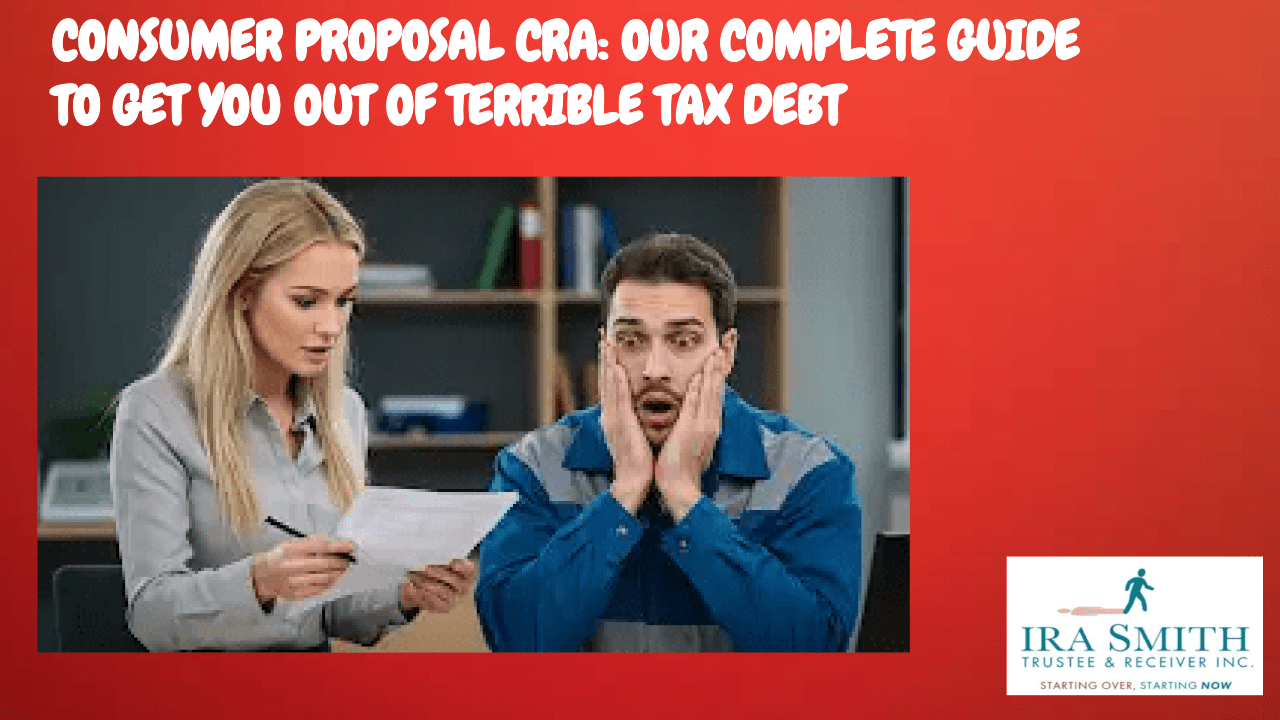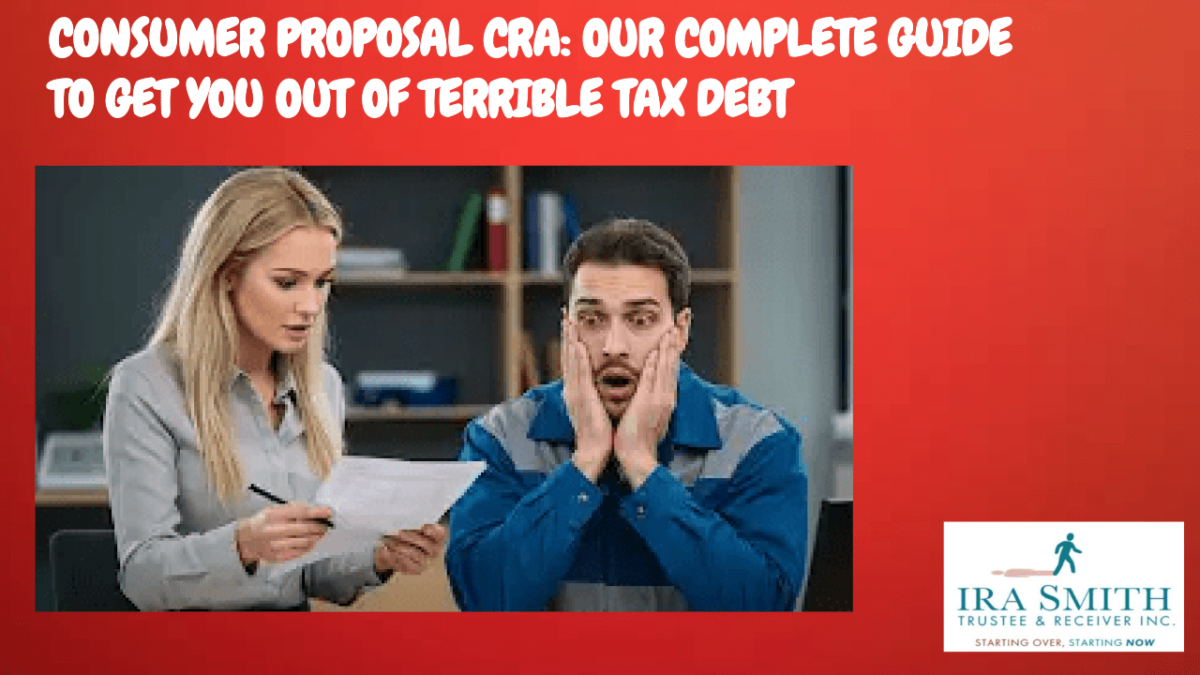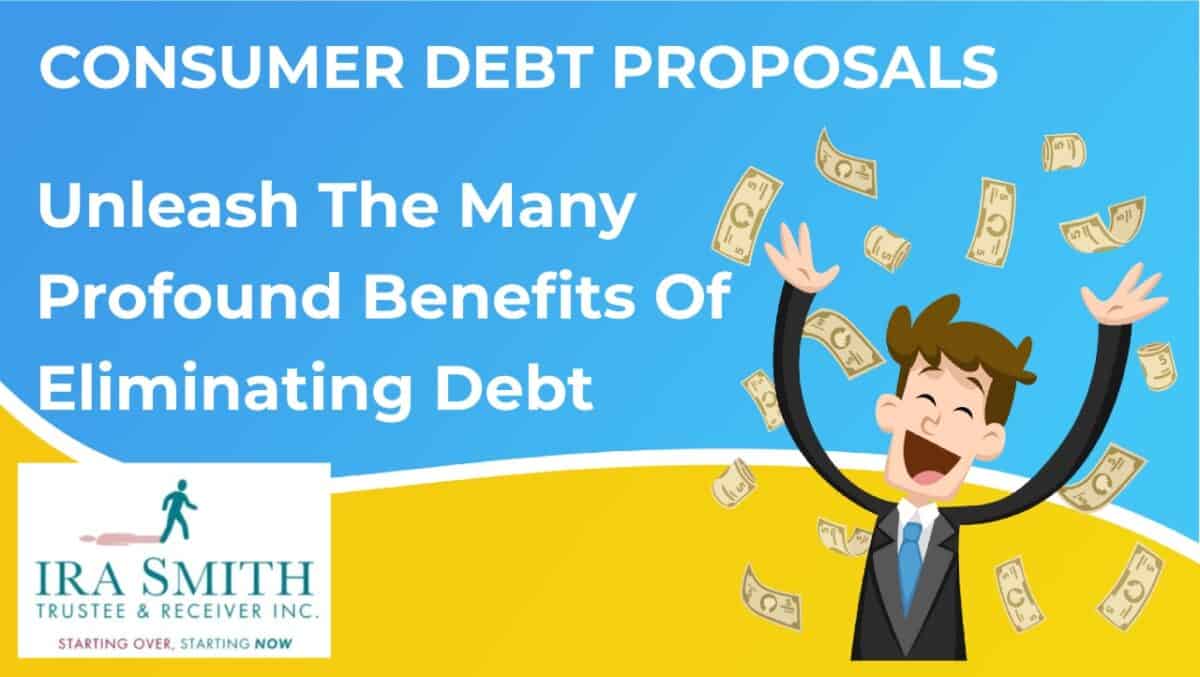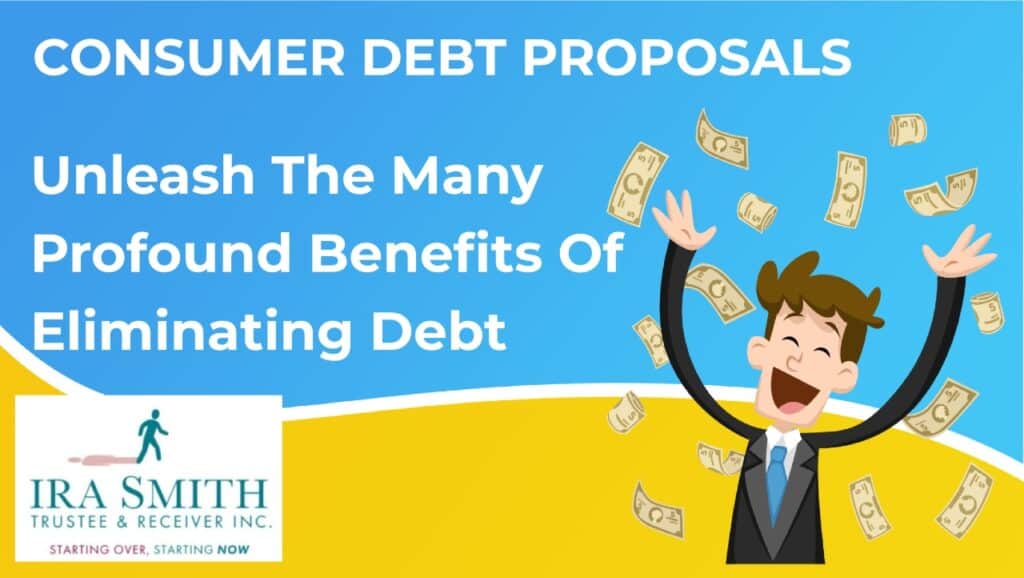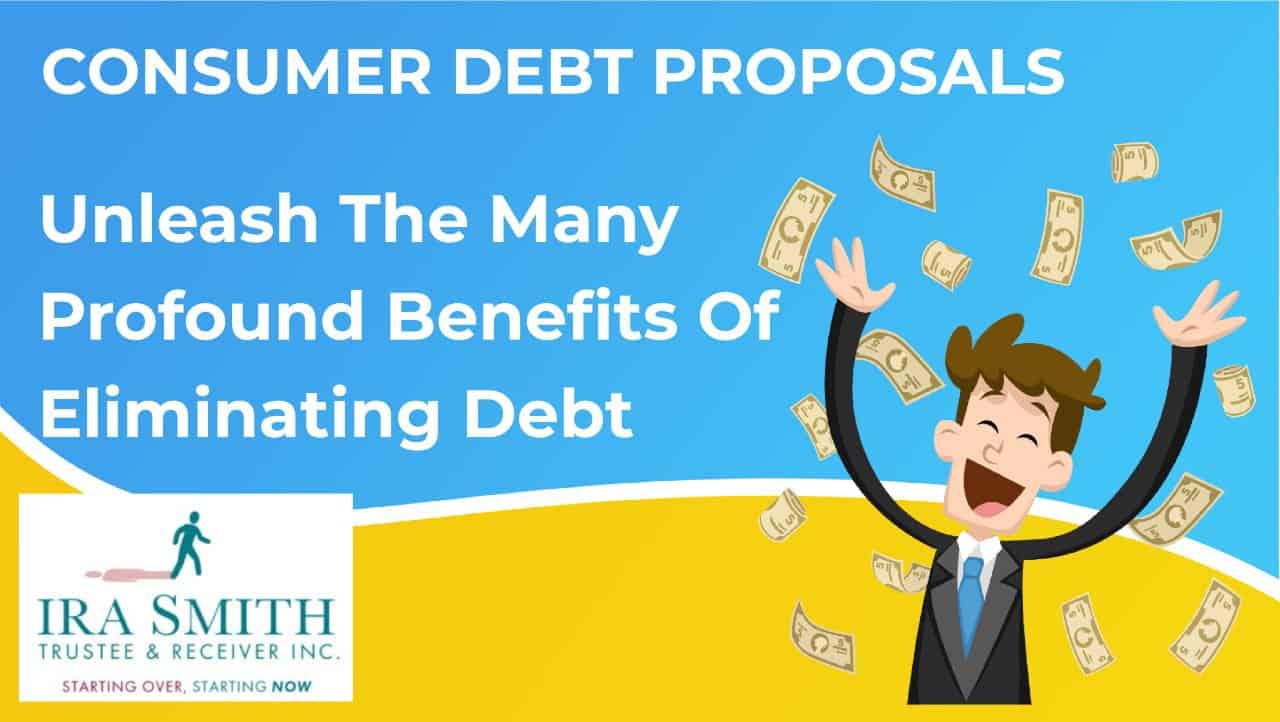Consumer Proposal CRA: Introduction
Very soon we will all start receiving our slips to prepare our 2024 income tax return. Tax season can be a stressful time, especially when you realize you owe money to the Canada Revenue Agency (CRA). It can feel like a huge weight on your shoulders, and sometimes it might feel like you’re drowning in debt. If you’re in this position, it can be hard to know where to turn, and it may feel like your finances have reached a tipping point. You’re not alone, and there are options to help you regain control. One of these options is a consumer proposal CRA to eliminate your tax debt.
As a Licensed Insolvency Trustee (LIT), I help people explore their options for managing debt, and I’m here to explain how it can work for you to eliminate your financial difficulties, especially when dealing with the CRA.
Understanding a Consumer Proposal CRA
A consumer proposal is like a formal legal agreement between you and the people you owe money to (your creditors). It is a debt management plan to legally reduce the amount of debt you have to pay back [1]. It’s a way to combine all your unsecured debts into one monthly payment, making it more manageable.
Think of it as a new arrangement that gives you a chance to repay your debts – or a portion of them – on terms that are more reasonable for you. This is a federally regulated debt reduction program [4] managed by a Licensed Insolvency Trustee. With a consumer proposal, you often end up paying back significantly less than what you originally owed. A great benefit is that interest doesn’t keep adding up, which can save you a lot of money in the long run.
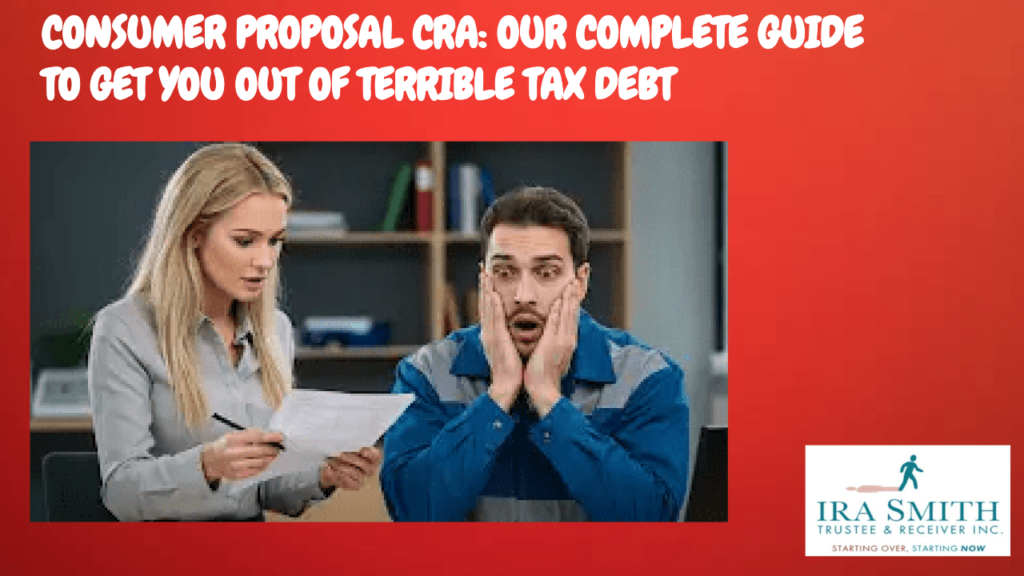
How a Consumer Proposal CRA Helps with CRA Tax Debt
You might be surprised to hear that income tax debt is actually considered an unsecured debt, just like credit card debt and other consumer debts. This means that even though is can be called a government debt, it can be included in a consumer proposal CRA debt. One of the biggest advantages of filing a consumer proposal is that it immediately stops the CRA from taking further action to collect the debt.
This includes things like garnishing your wages, freezing your bank account or constantly calling you for payment. With this tool, instead of having lots of individual payments to different creditors, you make one single monthly payment to the LIT, making it much easier to manage your finances. The periodic payments are structured and typically spread out over a specific period of time of no more than five years . It also gives you legal protection from your creditors.
CRA Requirements and Considerations for a Consumer Proposal CRA
The CRA has specific requirements when it comes to consumer proposals. It is essential that all your tax returns are up to date before you file. This means that even if the CRA has made an estimate of what you owe because you haven’t filed (called a notional assessment), you still need to file proper tax returns. You must also be prepared to file your future tax returns and pay your taxes on time during the period of the proposal.
You can include an estimate for the income tax you owe for the current year, up to the date you file the proposal. The CRA will look at your past earnings to make sure that the income you report is accurate. The CRA will also check to make sure that your proposal offers fair and reasonable terms, and that you are not trying to pay as little as possible. It’s important to know that the CRA will only be able to reduce your tax debt through a formal insolvency proceeding and will not accept other informal types of debt settlements.

Benefits of a Consumer Proposal CRA
Filing a consumer proposal has several advantages:
- It reduces your overall debt: You could end up paying significantly less than the total amount you owe.
- It protects you from collection actions: A consumer proposal CRA means that they have to stop contacting you and cannot take further legal action against you.
- It consolidates your payments: You make one single monthly payment instead of multiple payments to different unsecured creditors.
- It stops interest: Interest on your debt will stop accumulating.
- It offers flexible payment terms: You can discuss a payment plan that works best for you.
- It can save you significant money: Many people save a considerable amount of money when they use a consumer proposal CRA.
Is a Consumer Proposal CRA Right for You?
It’s important to know that it is not right for everyone. To qualify, your total unsecured debt must be less than $250,000, not including your mortgage. Unsecured debts are things like credit cards and other consumer debt not secured by a specific asset. Secured debts, such as mortgages and car loans, are not included. The best thing to do is to think about your personal circumstances and get advice from a LIT. A LIT can help you figure out if it is the best option for you.
Documentation Required for Submission
If you’re considering this option, here are the steps to take:
- Gather your financial information: Make a list of all your assets, and your debts. You should also be able to list your monthly income and expenses – in other words, your monthly budget, on an after tax basis.
Assessment of Your Financial Situation
- Consult with a Licensed Insolvency Trustee: A LIT will review your information, discuss options with you and guide you through the recommended process.
- Create a proposal: If the proposal route is right for you, you will work with your LIT to develop the proposal for your unsecuted creditors.
A LIT will explain how a consumer proposal CRA could affect your finances and help you decide if it’s right for you. It’s best to contact a LIT early so that you can address any issues before they become worse.

Frequently Asked Questions about Consumer Proposals and CRA Debt
What exactly is a consumer proposal and how does it work?
A consumer proposal CRA is a legally binding agreement between you and your creditors (those you owe money to). It’s a formal debt reduction program, regulated by the federal government and administered by a LIT. Essentially, you offer your creditors a revised repayment plan, typically over a specific period of time up to five years.
This usually involves paying back a portion of your total debt, often significantly less than the original amount owed, and importantly, interest on your debts stops accruing. This creates a structured repayment plan, with one single monthly payment, and offers a way to manage your unsecured debts.
Can I include my Canada Revenue Agency (CRA) tax debt in a consumer proposal?
Yes, absolutely. Income tax debt owed to the CRA is considered an unsecured debt, just like credit card debt or bank loans. This means it can be included in a consumer proposal. A consumer proposal will protect you from further collection actions by the CRA, such as wage garnishments, court actions and persistent collection calls. The CRA will deal with tax debt through a formal consumer proposal and will not consider informal debt settlements.
What are the key benefits of using a consumer proposal to manage CRA debt?
There are several advantages. Firstly, you can significantly reduce the overall amount of tax debt you have to repay. Secondly, it provides legal protection from collection actions by the CRA. Also, it consolidates all your debt payments into one manageable monthly payment. Critically, interest stops accumulating on the included debts, which can save you a lot of money over time. Finally, the process allows for flexible payment terms, which are negotiated with your creditors via an LIT.
What are the CRA’s specific requirements for accepting a consumer proposal?
The CRA has a few key requirements. First, you must have all of your past tax returns. This is crucial, and even if the CRA has estimated your taxes via a notional assessment, you will still need to file your proper tax returns to get all tax filings up to date.
Second, you must agree to file future tax returns and pay your taxes on time during the course of the proposal. You can also include an estimate for the income tax you owe for the current tax year up to the date you file the proposal, even though that tax filing is not due yet. The CRA will also review your income and expenses, to ensure the proposal is offering fair and reasonable terms and that you are not trying to minimize payment.
What types of debts can be included in a consumer proposal, and what debts are excluded?
A consumer proposal is primarily designed for unsecured debts. These are debts not linked to an asset, such as credit cards, bank loans, payday loans, and CRA income tax debt. Secured debts such as mortgages and car loans, are not included in consumer proposals. Also, some debts cannot be discharged through a consumer proposal. These typically include child support, spousal support and any court-ordered fines or penalties.
How do I know if a consumer proposal is the right solution for me?
A consumer proposal is not for everyone. To be eligible, your total unsecured debt must be less than $250,000 (excluding your mortgage). The best way to determine if it’s right for you is to assess your individual circumstances and consult with a Licensed Insolvency Trustee (LIT). An LIT can assess your financial situation, review all your options and advise you if a consumer proposal is the best choice for you and what your proposal payments may be. It is beneficial to seek help early before debt problems become worse.
What are the first steps I should take if I’m considering a consumer proposal?
First, gather all your financial information: income statements, a comprehensive list of all your debts and your monthly expenses. Then, consult with a Licensed Insolvency Trustee (LIT). They will explain the process, assess your eligibility and help you develop a consumer proposal for your creditors. It’s important to address debt issues promptly and with a professional, rather than ignoring them, to prevent further issues developing.
Will a consumer proposal CRA completely eliminate my debt?
A consumer proposal does not eliminate all debts entirely. It eliminates or reduces the unsecured debts it includes; any secured debts such as a mortgage, and non-dischargeable debts, like child support, will still need to be paid. The proposal offers a structured way to repay a significant portion, or all of the unsecured debts included in it, and a reduction of the overall debt burden. Remember that the key goal is to agree a manageable repayment plan that is affordable.
Conclusion: Navigating the Consumer Proposal CRA Process
Dealing with CRA debt can feel overwhelming and scary, but a consumer proposal CRA can be a way to find your path to financial freedom. It’s important to seek help rather than ignore the problem. Taking action early can prevent things from spiralling out of control. Contact a Licensed Insolvency Trustee today to start exploring your options and take that first step towards a more secure financial future.
I hope you enjoyed this consumer proposal CRA Brandon’s Blog. Do you or your company have too much debt? Are you or your company in need of financial restructuring? The financial restructuring process is complex. The Ira Smith Team understands how to do a complex restructuring. However, more importantly, we understand the needs of the entrepreneur or someone with too much personal debt.
You are worried because you are facing significant financial challenges. It is not your fault that you are in this situation. You have been only shown the old ways that do not work anymore. The Ira Smith Team uses new modern debt relief options to get you out of your debt troubles while avoiding the bankruptcy process. We can get you debt relief freedom using processes that are a bankruptcy alternative.
The stress placed upon you is huge. We understand your pain points. We look at your entire situation and devise a strategy that is as unique as you and your problems; financial and emotional. The way we take the load off of your shoulders and devise a plan, we know that we can help you.
We know that people facing financial problems need a realistic lifeline. There is no “one solution fits all” approach with the Ira Smith Team.
That is why we can develop a restructuring process as unique as the financial problems and pain you are facing. If any of this sounds familiar to you and you are serious about finding a solution, contact the Ira Smith Trustee & Receiver Inc. team today.
Call us now for a free consultation. We will get you or your company back on the road to healthy stress-free operations and recover from the pain points in your life, Starting Over, Starting Now.
The information provided in this Brandon’s Blog is intended for educational purposes only. It is not intended to constitute legal, financial, or professional advice. Readers are encouraged to seek professional advice regarding their specific situations. The content of this Brandon’s Blog should not be relied upon as a substitute for professional guidance or consultation. The author, Ira Smith Trustee & Receiver Inc. as well as any contributors to this Brandon’s Blog, do not assume any liability for any loss or damage.
